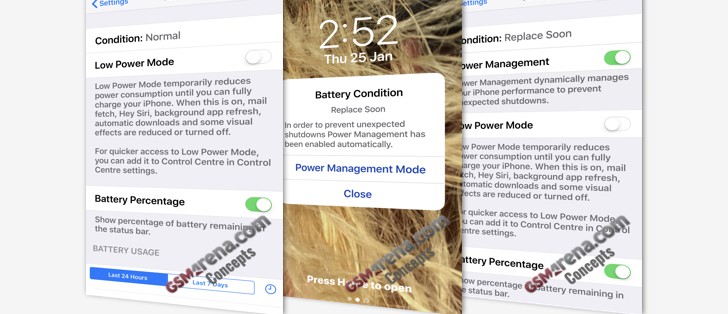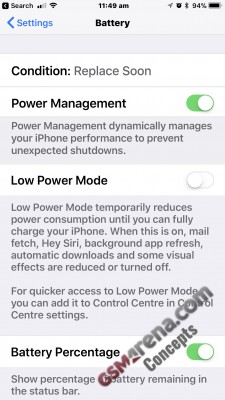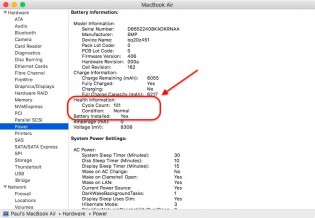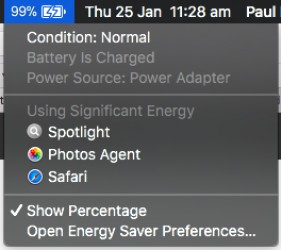
Apple has officially confirmed what Tim Cook announced in a speech earlier this month.
"iOS 11.3 adds new features to show battery health and recommend
if a battery needs to be serviced. These can be found in Settings ->
Battery and are available for iPhone 6 and later.
Additionally, users can now see if the power management
feature that dynamically manages maximum performance to prevent
unexpected shutdowns, first introduced in iOS 10.2.1, is on and can
choose to turn it off".
Apple is still working on these features, so they didn't make the cut
for the first iOS 11.3 beta. Before that, and putting all thoughts of
how Apple got to this point aside, we thought we'd have a bit of fun and
conceptualize what this feature would look like and highlight some of
the challenges Apple is facing.
First though, a little background
Apple has form in this area as they already provide several ways to
see the condition of your laptop battery within macOS. Within System
Information, select Power and you’ll see the condition of your battery
and Cycle Count. Alternatively, clicking on the battery icon within
macOS’s menu bar while pressing the ALT key will also show the battery
condition.
With macOS Apple has four battery states: Normal, Replace Soon, Replace Now and Service Battery.
iOS 11.3 Battery Health and Performance Management Concepts
Is it a simple case of Apple 'bubbling' this functionality up in iOS?
Even with the close family ties between macOS and iOS, it is not as
straightforward as you would think.
So the low hanging fruit first, our first concept shows how Apple
could allow you to check the health of your battery, simply by going
Settings->Battery, where you will be shown:
iPhone 8, iPhone 8 Plus and iPhone X are not 'yet' included in the
power managment system, so will we be able to see our battery health?
Our guess is yes for consistancy.
The next question is at what point, if any, do Apple inform the user
that their battery condition has changed state? So in this scenario, one
day your phone battery is healthy, and the next day it isn't. This will
also occur when Apple decides your iPhone 8, iPhone 8 Plus and iPhone X
are eligible for Dynamic Power Management - probably after an iOS
sub-point release. Here are some of the options Apple could adopt:
- Don't inform the user - let them keep checking their settings and face the public outcry
- When first installing or upgrading iOS
- During day to day use
Given the politics surrounding this subject, Apple has to inform the
user as soon as the battery state changes resulting in Performance
Management dynamically managing maximum performance to prevent
unexpected shutdowns. The following concept visualizes what that
notification might look like on the iPhone lock screen:
Notice here that we're using the macOS battery health conditions,
Apple will undoubtedly use different terminology. In our concept, we
give the option to go directly to the Power Management Mode within
settings, similar to when Low Power Mode kicks in. Will Apple want to
encourage users to do that though?
It also makes us wonder what the average user would make of this
and Apple's wordsmithing will need to be spot on - otherwise, those of
us who act as our parent's support hotline will be inundated with 'what
does this mean son?' calls.
Once the state of the iPhone battery has changed, and Performance
Management has kicked in, the Battery screen could look something like:

Concept: battery status for an aged battery and the option to toggle Performance Management
Here you can toggle on and off the Performance Management Mode.
Again, it will be interesting to see the exact wording that Apple will
use on this screen to make it clear to users why they shouldn't turn off
Performance Management.
So there you have it, a couple of fun concepts that give a possible
direction that Apple could go in when implementing these features in
future beta's of iOS 11.3.







No comments:
Post a Comment